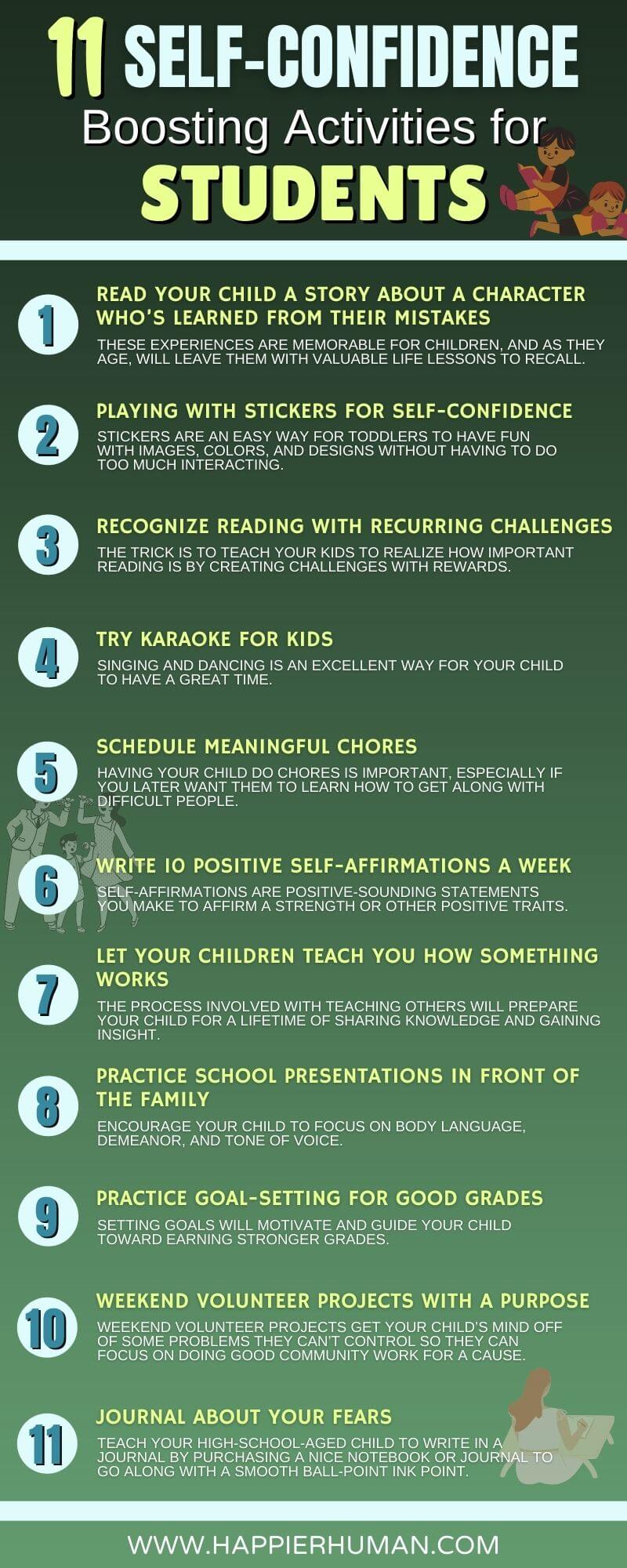There might be affiliate links on this page, which means we get a small commission of anything you buy. As an Amazon Associate we earn from qualifying purchases. Please do your own research before making any online purchase.
Your child attends school and participates in extracurricular activities. On the surface, things seem normal.
But lately, you've noticed they're shying away from challenging situations. Or staying to themselves. And, as a parent (or educator), you can't help but think they're struggling with low confidence.
So how can you give them a boost?
There are some age appropriate activities for students that can brighten their future and improve their current situation… it may just take a little time.
What are Self-Confidence Activities?
Self-confidence activities are fun experiences where someone will complete tasks, participate in challenges and practice games or exercises aimed at increasing one's overall confidence.
Self-confidence activities for students will focus on their strengths versus their weaknesses… then use repetition and positive self-talk to support growth that helps them feel stronger and more capable.
After each activity, your child will feel better about themselves overall while embracing new challenges and taking on greater responsibilities.
As an adult, you know that the world can knock you down with rejection. Your child will need to learn to hear the word “no” while dealing with failure, which is inevitable.
Children also have to learn how to deal with anxiety and stress without their confidence decreasing to the point that they can no longer progress. Building confidence takes time, patience, and practice.
One day your child may feel more optimistic about themselves and their future than on other days. But self-confidence activities for students are meant to stabilize your child's confidence regarding their school performance and personal life. Without these activities, low self-esteem and confidence pose a significant risk.
Self-Confidence Activities for Toddlers
Self-confidence begins in the home… and even toddlers can benefit from hearing positive-sounding statements.
From books featuring magnificent characters, to their favorite toys, self-confidence grows as your child feels great about engaging in constructive activities.
The goal behind self-confidence activities for toddlers is to get them to enjoy the games and activities, while seeing the positive benefits of participation.
For confidence to build, children need to find ways to engage more with what they like, as these routine activities provide the building blocks for confidence to grow throughout childhood.
1. Read your child a story about a character who's learned from their mistakes
Did you know there is research that suggests reading to your children improves the parent-child relationship? That's because, as a parent, you'll use an intriguing tone and exciting facial expressions to keep your child engaged with a book.
Even better if some of those stories include characters who have made mistakes and have learned from them, as stories with morals have a lingering impact on kids. These experiences are memorable for children, and as they age, will leave them with valuable life lessons to recall.

When it comes to confidence, kids have to start early, and that means encouraging them to have fun experiences with the things they like most. Kids love stories, and the stories that you want to matter the most should be on the top of your reading list.
Above all, it's hearing the words repeatedly that helps children grow more confident about reading as they grow older.
The more they hear their favorite stories, the more likely it is that those stories will help them detect the fun and positive tones in your voice. When kids get positive reinforcement, they're more likely to feel happier and more comfortable in their environment.
2. Playing with stickers for self-confidence
Stickers are an easy way for toddlers to have fun with images, colors, and designs without having to do too much interacting.
Your child is learning how to make sense of the world around them. Part of this process means exploring visuals and art to identify what they mean.
Stickers with colorful animals, characters, people, and objects will help your child interact with the people and elements surrounding them. Experiment with stickers by encouraging your child to try and name what they're seeing.
From there, you can sit back and feel delighted by the fact that your child is growing more confident as they get the answers correct. And if the answers are wrong, then it's okay. They're just stickers meant for fun and decoration.
Self-Confidence Activities for Elementary Students
By elementary school, your child will be ready to make friends and have fun at school. The increase in interaction will have an impact on your child's feelings and wellbeing.
Self-confidence activities for students are important in elementary school because children are at the beginning stages of learning how to get along with others. The more confident your child feels at this stage, the more likely they'll want to continue being outgoing and vocal.
3. Recognize reading with recurring challenges
Remember when you read to your toddler and saw their face light up when you got to the interesting parts?
That same enjoyment they had with reading when they were younger can take place again when your kids start reading on their own. The trick is to teach your kids to realize how important reading is by creating challenges with rewards.
For example, if your kid reads 10 pages in a week, then maybe you'd want to take them out for pizza on Friday. And if they read an entire book, then you might reward them with a favorite toy they've been wanting for awhile.
Either way, if you create an environment where children can earn money while reading, your child's cognitive function improves… which will only boost their confidence with each new book they read.
Self-confidence activities for students will often involve reading, as reading even one book a month enhances creativity and encourages students to keep reading more frequently.
4. Try karaoke for kids
Singing and dancing is an excellent way for your child to have a great time. At the same time, they'll have the chance to express themselves and enjoy the benefits of laughter for a better life.
Elementary school children will be less focused on how they sound and look. Your kid will also look to you for positive feedback regarding their performance.
If it's only in the spirit of having fun, confidence is less of an issue. But with a planned, weekly karaoke event suited just for your children?
That's more than an opportunity for your child to get positive feedback on their performance. You'll be laughing and having a good time, and your child will see the karaoke activity as an enjoyable experience.
Self-Confidence Activities for Middle-Grade Students
Students in middle school are already beginning to notice that life can get complicated. Relationships may be toxic and the classroom can feel unsettling. Even with excuses sabotaging your child's happiness, opportunities to build confidence will increase.

Now, your child will have access to extracurricular activities that can boost their self-esteem and make them feel great about themselves. Ask yourself what areas of your child's academic and personal development are most important at the moment.
Later, you'll see that building confidence in middle school is imperative to prepare children for greater rejection and disappointment.
5. Schedule meaningful chores
Having your child do chores is important, especially if you later want them to learn how to get along with difficult people.
From taking out the trash to sweeping and mopping the kitchen floor, to cutting the grass and cleaning the bathroom, chores are a way to teach children responsibility and respect for themselves and their property.
This idea is to get your child thinking of their own apartments and how they want their spaces to look.
Cleaning exercises are also a great way to teach middle-grade students the importance of cleanliness and personal hygiene. But mindless chores dull kids' minds and trick them into believing routine chores are punishment. To improve confidence, insert meaning and purpose into each chore.
When assigning a time of day and week to complete chores, encourage your middle school-aged child to work toward a deadline with a positive attitude and a bright smile on their face.
Chores keep the family together and builds your child's confidence every time they complete a task. They prove to your child that they're smart and capable enough to complete tasks that improve the appearance of the home. So, make sure to define each chore so that your child knows the overarching benefit of each.
To help you manage your day better and make sure all these meaningful chores get done, it's important for kids to have a morning routine. This adds structure to your day and reduces a lot of the stress and anxiety. The video below provides a 6-step process you can use to create a great morning routine for your kids.
6. Write 10 positive self-affirmations a week
Self-affirmations are positive-sounding statements you make to affirm a strength or other positive traits. Self-affirmations are essential for kids who are feeling down, lost, or low on confidence.
All children can benefit from learning how to train their minds to recognize their positive traits. These statements are only one line and can replace weaknesses and parts of your child's character they don't like as much.
But why 10 self-affirmations a week?
The more positive statements your child collects about themselves, the greater impact reading those statements back to themselves will have. For example, if your child writes the sentence, “I like myself because I'm creative”, then they'll naturally lean towards creativity and expression when faced with significant obstacles.
If your child writes the self-affirmation, “I can do whatever good I set out to do,” then they'll be eager to pursue new challenges going forward. After all, they'll have taught themselves over time that they can do well if they work hard and apply themselves.
Self-affirmations turn into soundtracks that play in your child's mind as they progress in life, so that even when they struggle to fake a smile, they'll still have some inner confidence within them.
If you want more encouraging affirmations, be sure to check out these blog posts:
- 105 Affirmations for Kids for a Daily Dose of Positivity
- 121 Positive Kindergarten Affirmations That Kids Will Love
- 96 Parenting Affirmations for Tough Moments with Your Kids
7. Let your children teach you how something works
A middle-grade student might have some insight into technology that you might not have. They may be thrilled to show you how to succeed in their favorite video game, how to use apps designed for education, or how to excel at a hobby.
For example, if your child loves chess and can play well, give them the chance to teach you how they learned strategies and tactics beyond what you already taught them. Not only will you be wowed by their knowledge as a parent, but your child will also grow with confidence now that they've shown someone else how to do something.
Research shows teaching others will help anyone, including children, remember what they learned and apply that knowledge to life. The process involved with teaching others will prepare your child for a lifetime of sharing knowledge and gaining insight.
While your child might feel comfortable with the knowledge they do have, sharing it with someone else will make them feel more confident the next time they embrace the subject, topic, or challenge.
8. Practice school presentations in front of the family
Have your child gather their notes, textbooks, and other resources, and then have them dress nicely for the occasion. Explain to the family that your child's school presentation is relevant and necessary, and that every individual in the household can benefit from listening.
Practicing school presentations in front of the family let your child build confidence each time they go over their speech and realize they're improving. Your job is to stay focused on their presentation while offering constructive criticism and positive feedback. Encourage your child to focus on body language, demeanor, and tone of voice.
Afterward, you can tell your child how their performance at school improved from their performance at home.
Self-Confidence Activities for High School Students
Your child's confidence may never be more important to address than it is in high school.
On any given day, there may be rejection, bullying, burnout, or peer pressure that can cause your child's confidence to take a hit. Encourage your teen to embrace criticism and learn from it.
While their transition from high school into adulthood may be filled with accomplishments, there will also be rejection and disappointment. It's up to you to create some self-confidence activities meant to keep your child feeling great about their abilities.
9. Practice goal-setting for good grades
Setting goals will motivate and guide your child toward earning stronger grades. Beyond that, goals are behind everything your child will want to accomplish in life.
Take 20-30 minutes every week for you and your child to brainstorm some goals. To build confidence, the goals need to give your child the chance to see where all obstacles lie between them and accomplishing the goal.
Goal-setting puts your kid in control so that they can take full credit for their success.
With confidence-building, you want to cover every aspect of your child's education. So, write down goals for learning, building relationships, and participating in extracurricular activities.
Remember, the more goals you set, the more time your child will have to face their fears, struggles, and academic challenges.
Ready for an example? How about goal setting for self-care, with the idea that you'd be in a better position to focus on yourself.
10. Weekend volunteer projects with a purpose
While they're in high school, children will begin to see the problems with the world around them. Climate change, mental health reform, and violence in schools are issues that may make your child doubt their ability to stay strong through tough times.

Weekend volunteer projects get your child's mind off of some problems they can't control so they can focus on doing good community work for a cause. Why the weekend? Because kids are already so tied up throughout the week for school.
Hard work, working with a purpose, work ethic, and self-discipline will all have a positive impact on your child's confidence.
The more effort they put into good work, the more they'll reap the rewards. The work-reward cycle can push your child to want to work harder and smarter, all while figuring out how to make the most of volunteer opportunities.
Whether your child is interested in working at an animal shelter or homeless soup kitchen, they'll feel more positive about their abilities as they continue putting them to good use.
11. Journal about your fears
Journaling gives your child the opportunity to improve their writing skills. Teens who write in a journal will also have a private space and time to capture their feelings, thoughts, ideas, and pertinent memories.
Teach your high-school-aged child to write in a journal by purchasing a nice notebook or journal to go along with a smooth ball-point ink point.
Encourage your children to spend at least 15 minutes at a time journaling, but focus their minds on the details that make them feel more valuable, stronger, smarter, and capable.
For example, for a strong grade on a written assignment, your child can journal about the assignment topic and how they felt better after responding. Meanwhile, extracurricular activities provide ample opportunity for your child to explore their growth away from school.
Journaling can improve your child's confidence both in the short term and in the long run. While journaling, your teen will develop the habit of writing about problems that affected them in a constructive and productive manner. A journal lets your child explore what's going right and what's going wrong.
Over time, this record-keeping and close observation lead to heightened self-awareness, as the details they record will give them greater insight into themselves. The longer your child writes in a journal, the more likely they'll learn important details regarding their daily decisions, personality, and ways of handling problems.
Learning and growing are keys to building confidence. With a journal, your teen student will gain the strength needed to think more critically and apply what they learn about themselves to their lives.
Final Thoughts on Self-Confidence Activities for Students
Developing self-confidence isn’t an endeavor that is likely to be accomplished overnight.
As a parent, guardian, caregiver, teacher or mentor… you’ll need to incorporate a variety of self-confidence activities into the child’s life so that they can continue focusing on their abilities, strengths, and positive traits.
Continually remind them of all that is good in themselves… and in life. Positive reinforcement form someone they admire is key in molding young minds.
To take the next step toward building confidence, check out these blog posts:
- 19 Self-Confidence Building Exercises Every Person Should Try
- 15 Habits to Increase Your Self-Confidence
- 7 Self-Esteem Apps to Give Your Confidence a Daily Boost
Finally, if you want to increase your happiness and life satisfaction, then watch this free video that details the 7-minute habit for planning your day to focus on what's important.


